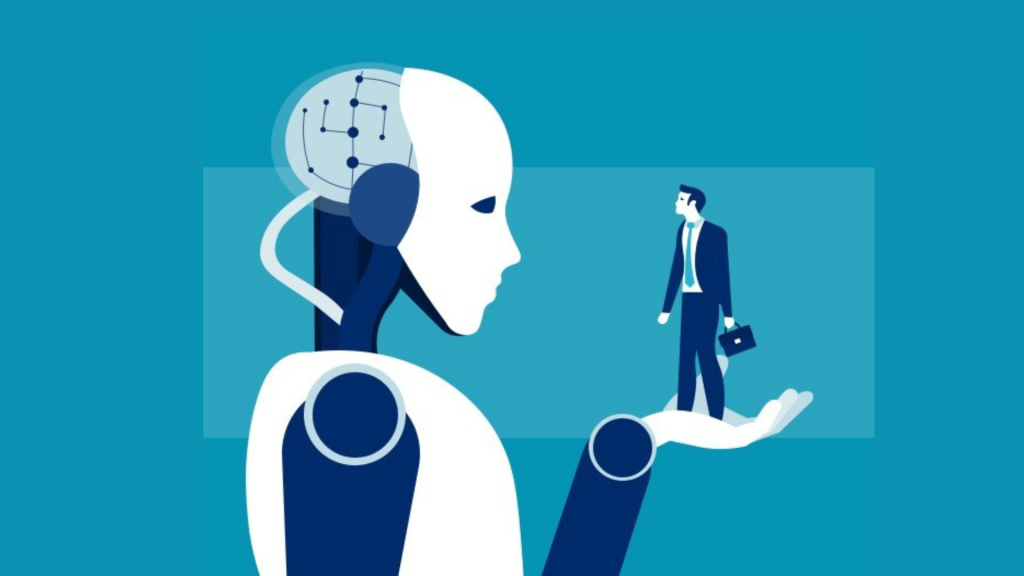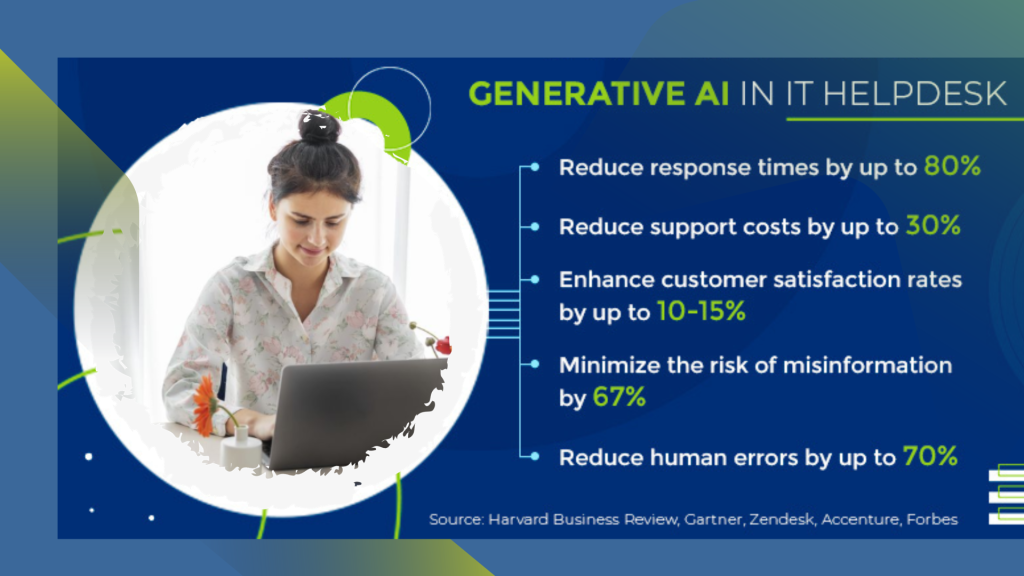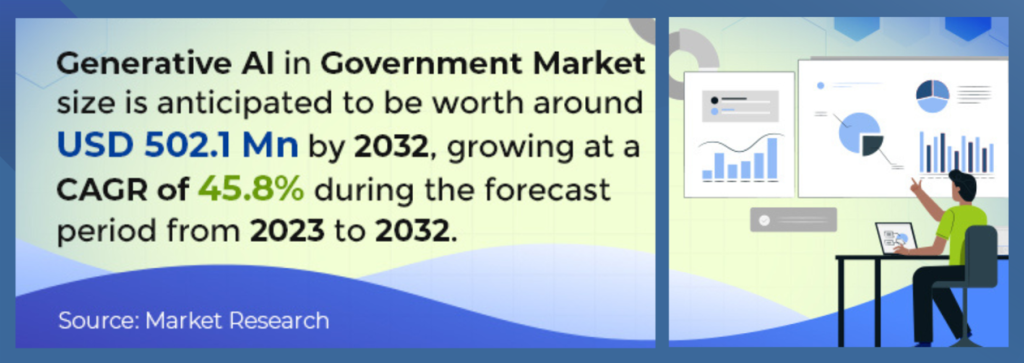The dawn of 2024 has ushered in not just another year but a pivotal era in technological advancement, and at its helm is GenAI. While Artificial Intelligence (AI) has been a transformative force over the last decade, GenAI or Generation AI, represents the next frontier. It’s an AI that’s more adaptive, intuitive, and better integrated into human workflows. In essence, it’s a leap forward from what we knew AI could do, to realms we hadn’t fully imagined.
Nowhere is this transformation more evident than in the world of service desks. Traditional support systems, once burdened by manual processes and repetitive tasks, are witnessing a monumental shift. With GenAI, service desks have metamorphosed into powerhouses of efficiency and precision, offering unparalleled employee support. In this world where the digital landscape is evolving at an unprecedented rate, GenAI stands as a testament to the boundless potential of integrating cutting-edge technology into everyday operations.
The Current State of Traditional Service Desks
Service desks are the lifelines of organizations, ensuring seamless operation and providing pivotal support to employees. However, traditional service desks have often found themselves plagued with limitations, hampered by outdated models that focus heavily on reactive measures and manual interventions. They have been constrained by the finite capability to handle query volumes, leading to slower response times and, consequently, operational bottlenecks.
In the pre-GenAI era, the service desk landscape was characterized by disjointed technologies that struggled to keep up with the ever-evolving demands of businesses and their workforce. The myriad of challenges included inadequate knowledge bases, limited accessibility, and a lack of personalized support, creating a pressing need for transformation and modernization. In such an environment, the infusion of innovative technology became imperative to transcend the inherent constraints of traditional service desk models.
The transformative power of technology, especially AI, became the beacon of change, fostering the development of more proactive, scalable, and sophisticated service desk solutions. These advanced solutions are not mere upgrades but revolutionary changes, addressing the core deficiencies of their predecessors while introducing unprecedented capabilities. The shift to modern, technology-driven help desks is not just a trend but a necessity, underlined by the growing complexity and diversity of organizational ecosystems in today’s digital age.
GenAI Revolution in Service Desks
In the rapidly evolving technological landscape, GenAI serves as the harbinger of innovation and efficiency in service desks. It redefines the paradigms of employee support by leveraging advanced learning algorithms and adaptive mechanisms to comprehend and resolve issues with unparalleled precision and speed. GenAI delves deeper into user queries, understanding nuances and contexts that were once the domain of human agents alone.
Integrating GenAI into service desk operations brings forth a spectrum of benefits. It transforms service desks into intelligent hubs capable of delivering personalized and immediate solutions, paving the way for enhanced user satisfaction and productivity. One of the standout advantages is the capability of GenAI to predict and prevent issues before they impact the users, reducing downtime and maintaining operational continuity.
Furthermore, GenAI enhances the scalability of service desks, enabling them to manage fluctuating volumes of queries without compromising on the quality of support. This adaptability is crucial for organizations aiming to stay ahead in the competitive and dynamic business environment. By automating routine tasks and queries, GenAI also allows human agents to focus on more complex and value-added activities, fostering innovation and skill development.
Comparison of Traditional Service Desk and GenAI Service Desk
The evolution of service desks from traditional models to GenAI-powered ones marks a pivotal shift in the paradigm of employee support. Below is a comparison table that succinctly illustrates the contrasts between them:
| Aspect | Traditional Service Desk | GenAI Service Desk |
| Response Time | Slower due to manual processes. | Significantly faster due to intelligent automation. |
| Operational Cost | Higher due to reliance on human resources. | Reduced by optimizing resources and automating tasks. |
| User Satisfaction | Limited due to slower and less personalized responses. | Enhanced by fast, accurate, and personalized support. |
| Scalability | Struggles with high query volumes, requiring more resources. | Easily handles fluctuating volumes without additional resources. |
| Proactivity | Mainly reactive, addressing issues as they arise. | Predictive, identifying and resolving issues before impact. |
| Knowledge Base | Often outdated and not comprehensive. | Continuously updated and expanded through learning algorithms. |
| Integration with Other Systems | Limited and often requires manual intervention. | Seamless, with advanced APIs and interoperability. |
| Data Security and Privacy | May lack advanced security features. | Built-in advanced security protocols to protect user data. |
In essence, while traditional service desks are hindered by manual processes and limitations in scalability and proactivity, GenAI service desks excel in delivering fast, personalized, proactive, and secure support, adapting to growing demands and integrating seamlessly with other systems, all while optimizing operational costs.
What Do Numbers Say?
The transformative potential and efficacy of GenAI in service desks are not just theoretical assertions but are substantiated by compelling statistics. A recent study reveals that organizations leveraging GenAI have witnessed a remarkable 30-45% reduction in response times, enabling faster resolution of user queries and issues.
Equally significant is the fact that the integration of GenAI results in a 30% decrease in operational costs for service desks. This cost efficiency is achieved through automation and optimization, allowing resources to be allocated more effectively. In the realm of user satisfaction, GenAI-powered service desks have seen an impressive 55% increase in user satisfaction scores, underscoring the enhanced quality and personalization of support delivered.
Moreover, 30% of IT professionals already say that their peers are using AI to automate everyday tasks!
Furthermore, the adaptability and scalability of GenAI have enabled service desks to handle 50% more queries without the need for additional resources. This capability is pivotal for maintaining high service levels during peak times and for organizations experiencing growth.
Lastly, 70% of Service Desk Managers believe that GenAI is instrumental in freeing up human agents, allowing them to focus on complex issues and continuous learning, which is critical in the ever-evolving IT landscape.
Challenges and Solutions
Integrating GenAI into service desks is not without its challenges. The process often encounters resistance due to misconceptions about AI replacing human roles and concerns about data security and privacy. Additionally, the transition necessitates a shift in organizational culture and workflows, which can be daunting for both management and employees.
To navigate these challenges, clear communication and education about the role and benefits of GenAI are crucial. It is vital to emphasize that GenAI augments human capabilities and does not replace them. Addressing data security concerns transparently and implementing robust security measures are also paramount. Furthermore, a phased approach to implementation, coupled with continuous training and support, can ease the transition and foster acceptance and adaptation among employees.
For instance, GenAI Service Desk solutions like Rezolve.ai make adoption and implementation of this technology at enterprise level a breeze. Not only do you get an AI employee service desk within MS Teams, but your migration and entire switch is handled by the team like a pro.
Closing Note
GenAI is unequivocally revolutionizing service desks, transforming them into highly efficient and intelligent support systems. By reducing response times, optimizing operational costs, enhancing user satisfaction, and enabling scalability, GenAI is redefining what is achievable in employee support. It is not merely a technological upgrade; it is a strategic enhancement that brings forth unparalleled value and competitive advantage to organizations navigating the dynamic digital landscape.
Peering into the future, the evolution of GenAI promises even more groundbreaking advancements. We can envisage service desks becoming increasingly proactive, with the capability to predict and mitigate a wider array of issues, further diminishing downtimes and enhancing user experiences.
As already demonstrated by Generative AI service desk solution like Rezolve.ai, GenAI’s continuous learning and adaptability hint at a future where the synergy between humans and AI reaches new heights, bringing unprecedented innovations and possibilities to the world of service desks.



